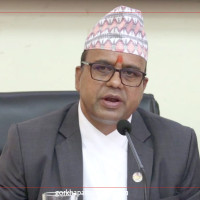- Wednesday, 22 January 2025
In ‘Wakanda Forever,’ an empire mourns and rebuilds
New York, Nov. 13: Made in the wake of tragedy, “Black Panther: Wakanda Forever” reverberates with the agony of loss, piercing the usually less consequential superhero realm. Like someone going through the stages of grief, Ryan Coogler’s movie is at turns mournful and rootless, full of rage and blessed with clarity. In the fantastical Marvel Cinematic Universe where mortality is almost always a plaything, wrestling with the genuine article, in the death of T’Challa star Chadwick Boseman, makes for an unusually uncertain, soul-searching kind of blockbuster-scale entertainment.
It’s a fine line, of course, between paying tribute and trading on it. I did cringe a little when the Marvel logo unspooled with images of Boseman within the letters: Eulogy as branding. That “Black Panther,” a cultural phenomenon and a box-office smash, would get a sequel, at all, was momentarily in doubt after Boseman’s unexpected death from colon cancer
in 2020.
Part of the profound appeal of Coogler’s first “Black Panther” resided in its deft channelling of the real world into mythology. It fed centuries of colonialism and exploitation into a big-screen spectacle of identity and resistance. In an invented African nation, Coogler conjured both a fanciful could-have-been history and emotional right-now reality.
“Wakanda Forever,” which opened in theatres from Thursday, expands on that, weaving in a Latin American perspective with a similar degree of cultural specificity in the introduction of the Aztec-inspired antagonist Namor (Tenoch Huerta), king of the ancient underwater world of Talokan. At the same time, Boseman’s death is poignantly filtered into the story from the start, beginning with off-screen death throes.
“Time is running out,” we hear whispered while the screen is still black. Shuri (Letitia Wright), T’Challa’s tech-wiz sister, is frantically trying to craft something in her AI lab to save her brother. But in a moment,
their mother, Queen Ramonda (Angela Bassett), informs her: “Your brother is with the ancestors.” He’s laid to rest in a glorious, celebratory procession, carried through a multi-tiered channel of white-clad, singing-and-dancing Wakandans. It’s as stunning as anything Coogler
has shot.
What follows is a globe-trotting plot that draws the film away from perhaps its greatest asset in Wakanda but uncovers new places of latent power among historically exploited people. Shuri and Okoye (Danai Gurira), the Dora Milaje general, travel to Cambridge, Massachusetts, to seek the student (Dominique Thorne) who created a
vibranium detector.
In the Washington D.C. area, Wakanda’s friendly CIA officer (Martin Freeman) experiences new scrutiny from his boss, played by an unannounced comic actress familiar to
Beltway politics.
As in the first “Black Panther,” the question again hangs in the balance of whether, in a pain-ridden and prejudiced world, rage is the answer. This time, it applies to another powerful civilization, too. “Wakanda Forever,” where the role of Black Panther is passed down, is in more ways than one about the transfer of power.
Wakanda and Talokan are brought together a little haphazardly in conflict, as Namor pressures the
African nation to join his brewing surface war. “Wakanda Forever” proceeds as a murky, middle-act film that may ultimately serve as a bridge to future “Black Panther” chapters. Lupita Nyong’o is unfortunately less central here, but every time her Nakia (who has been laying low in Haiti) is present, she graces
the film.
“Wakanda Forever” is overlong, a little unwieldy and somewhat mystifyingly steers toward a climax on a barge in the middle of the Atlantic. But Coogler’s fluid command of mixing intimacy with spectacle remains gripping. “Wakanda Forever,” grappling in the aftermath of loss, ultimately seeks something rare in the battle-ready superhero
landscape: Peace. AP
New York, Nov. 12
Made in the wake of tragedy, “Black Panther: Wakanda Forever” reverberates with the agony of loss, piercing the usually less consequential superhero realm. Like someone going through the stages of grief, Ryan Coogler’s movie is at turns mournful and rootless, full of rage and blessed with clarity. In the fantastical Marvel Cinematic Universe where mortality is almost always a plaything, wrestling with the genuine article, in the death of T’Challa star Chadwick Boseman, makes for an unusually uncertain, soul-searching kind of blockbuster-scale
entertainment.
It’s a fine line, of course, between paying tribute and trading on it. I did cringe a little when the Marvel logo unspooled with images of Boseman within the letters: Eulogy as branding. That “Black Panther,” a cultural phenomenon and a box-office smash, would get a sequel, at all, was momentarily in doubt after Boseman’s unexpected death from colon cancer
in 2020.
Part of the profound appeal of Coogler’s first “Black Panther” resided in its deft channelling of the real world into mythology. It fed centuries of colonialism and exploitation into a big-screen spectacle of identity and resistance. In an invented African nation, Coogler conjured both a fanciful could-have-been history and emotional right-now reality.
“Wakanda Forever,” which opened in theatres from Thursday, expands on that, weaving in a Latin American perspective with a similar degree of cultural specificity in the introduction of the Aztec-inspired antagonist Namor (Tenoch Huerta), king of the ancient underwater world of Talokan. At the same time, Boseman’s death is poignantly filtered into the story from the start, beginning with off-screen
death throes.
“Time is running out,” we hear whispered while the screen is still black. Shuri (Letitia Wright), T’Challa’s tech-wiz sister, is frantically trying to craft something in her AI lab to save her brother. But in a moment,
their mother, Queen Ramonda (Angela Bassett), informs her: “Your brother is with the ancestors.” He’s laid to rest in a glorious, celebratory procession, carried through a multi-tiered channel of white-clad, singing-and-dancing Wakandans. It’s as stunning as anything Coogler
has shot.
What follows is a globe-trotting plot that draws the film away from perhaps its greatest asset in Wakanda but uncovers new places of latent power among historically exploited people. Shuri and Okoye (Danai Gurira), the Dora Milaje general, travel to Cambridge, Massachusetts, to seek the student (Dominique Thorne) who created a
vibranium detector.
In the Washington D.C. area, Wakanda’s friendly CIA officer (Martin Freeman) experiences new scrutiny from his boss, played by an unannounced comic actress familiar to
Beltway politics.
As in the first “Black Panther,” the question again hangs in the balance of whether, in a pain-ridden and prejudiced world, rage is the answer. This time, it applies to another powerful civilization, too. “Wakanda Forever,” where the role of Black Panther is passed down, is in more ways than one about the transfer
of power.
Wakanda and Talokan are brought together a little haphazardly in conflict, as Namor pressures the
African nation to join his brewing surface war. “Wakanda Forever” proceeds as a murky, middle-act film that may ultimately serve as a bridge to future “Black Panther” chapters. Lupita Nyong’o is unfortunately less central here, but every time her Nakia (who has been laying low in Haiti) is present, she graces
the film.
“Wakanda Forever” is overlong, a little unwieldy and somewhat mystifyingly steers toward a climax on a barge in the middle of the Atlantic. But Coogler’s fluid command of mixing intimacy with spectacle remains gripping. “Wakanda Forever,” grappling in the aftermath of loss, ultimately seeks something rare in the battle-ready superhero
landscape: Peace.AP
New York, Nov. 12
Made in the wake of tragedy, “Black Panther: Wakanda Forever” reverberates with the agony of loss, piercing the usually less consequential superhero realm. Like someone going through the stages of grief, Ryan Coogler’s movie is at turns mournful and rootless, full of rage and blessed with clarity. In the fantastical Marvel Cinematic Universe where mortality is almost always a plaything, wrestling with the genuine article, in the death of T’Challa star Chadwick Boseman, makes for an unusually uncertain, soul-searching kind of blockbuster-scale
entertainment.
It’s a fine line, of course, between paying tribute and trading on it. I did cringe a little when the Marvel logo unspooled with images of Boseman within the letters: Eulogy as branding. That “Black Panther,” a cultural phenomenon and a box-office smash, would get a sequel, at all, was momentarily in doubt after Boseman’s unexpected death from colon cancer
in 2020.
Part of the profound appeal of Coogler’s first “Black Panther” resided in its deft channelling of the real world into mythology. It fed centuries of colonialism and exploitation into a big-screen spectacle of identity and resistance. In an invented African nation, Coogler conjured both a fanciful could-have-been history and emotional right-now reality.
“Wakanda Forever,” which opened in theatres from Thursday, expands on that, weaving in a Latin American perspective with a similar degree of cultural specificity in the introduction of the Aztec-inspired antagonist Namor (Tenoch Huerta), king of the ancient underwater world of Talokan. At the same time, Boseman’s death is poignantly filtered into the story from the start, beginning with off-screen
death throes.
“Time is running out,” we hear whispered while the screen is still black. Shuri (Letitia Wright), T’Challa’s tech-wiz sister, is frantically trying to craft something in her AI lab to save her brother. But in a moment,
their mother, Queen Ramonda (Angela Bassett), informs her: “Your brother is with the ancestors.” He’s laid to rest in a glorious, celebratory procession, carried through a multi-tiered channel of white-clad, singing-and-dancing Wakandans. It’s as stunning as anything Coogler
has shot.
What follows is a globe-trotting plot that draws the film away from perhaps its greatest asset in Wakanda but uncovers new places of latent power among historically exploited people. Shuri and Okoye (Danai Gurira), the Dora Milaje general, travel to Cambridge, Massachusetts, to seek the student (Dominique Thorne) who created a
vibranium detector.
In the Washington D.C. area, Wakanda’s friendly CIA officer (Martin Freeman) experiences new scrutiny from his boss, played by an unannounced comic actress familiar to
Beltway politics.
As in the first “Black Panther,” the question again hangs in the balance of whether, in a pain-ridden and prejudiced world, rage is the answer. This time, it applies to another powerful civilization, too. “Wakanda Forever,” where the role of Black Panther is passed down, is in more ways than one about the transfer
of power.
Wakanda and Talokan are brought together a little haphazardly in conflict, as Namor pressures the
African nation to join his brewing surface war. “Wakanda Forever” proceeds as a murky, middle-act film that may ultimately serve as a bridge to future “Black Panther” chapters. Lupita Nyong’o is unfortunately less central here, but every time her Nakia (who has been laying low in Haiti) is present, she graces
the film.
“Wakanda Forever” is overlong, a little unwieldy and somewhat mystifyingly steers toward a climax on a barge in the middle of the Atlantic. But Coogler’s fluid command of mixing intimacy with spectacle remains gripping. “Wakanda Forever,” grappling in the aftermath of loss, ultimately seeks something rare in the battle-ready superhero
landscape: Peace. (AP)









-original-thumb.jpg)






